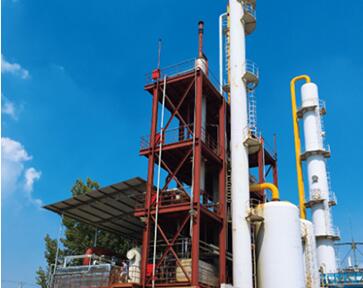隨著節能減排政策不時不得人心,很多企業都打算應用污水站的沼氣局部替代自然氣,進入鍋爐熄滅或發電。那么,沼氣應用前的硫化氫脫除工藝(脫硫),就成為工廠和站長們的選擇難點。當前,比擬常用的工藝有干法脫硫、濕法脫硫和生物脫硫,本文就將三種工藝為您做一個簡單的闡明和比照。
With the unpopular policy of energy saving and emission reduction from time to time, many enterprises intend to use biogas from sewage stations to replace natural gas partially and enter boilers to extinguish or generate electricity. So, the hydrogen sulfide removal process (desulfurization) before the application of biogas has become a difficult choice for factories and stationmasters. At present, compared with the commonly used processes are dry desulfurization, wet desulfurization and biological desulfurization, this paper will give you a simple explanation and comparison of the three processes.
一、 常見的脫硫工藝
I. Common desulfurization processes
1. 干法脫硫
1. Dry Desulfurization
沼氣從脫硫塔的一端,經過填料層(主要成分是活性炭和氧化鐵)凈化后,從另一端流出。硫化氫與填料層的氧化鐵發作反響,生成硫化鐵;待氧化鐵反響完畢后,可停止再生。
Biogas flows from one end of the desulfurization tower to the other end after being purified by a packed layer (mainly composed of activated carbon and iron oxide). Hydrogen sulfide reacts with iron oxide in the filler layer to form iron sulfide, and the regeneration can be stopped after the reaction of iron oxide is completed.
脫硫原理:
Desulfurization principle:
Fe2O3 · H2O+ 3H2S = Fe2S3 + 4 H2O
Fe2O3.H_2O+3H_2S = Fe2S_3+4H_2O
再生原理:
Regeneration principle:
Fe2S3 + 3/2 O2+ 3 H2O = Fe2O3 ·H2O + 2 H2O+ 3 S
Fe2S3+3/2 O 2+3 H 2 = Fe2O3.H 2+2 H 2+3 S
2. 濕法脫硫
2. Wet Desulfurization
濕法脫硫是將沼氣送入洗濯塔,經堿性溶液洗濯吸收后流出,洗濯液進入富液槽、再生槽,經過運用化學藥劑辦法催化、氧化,終將硫化物轉化為單質硫(硫泡沫),吸收液能夠再生循環運用。
Wet desulphurization is to send methane into the washing tower, wash it through alkaline solution, wash it out, wash the liquid into the rich liquid tank and regeneration tank, and then use the chemical method to catalyze and oxidize. Finally, the sulphide is converted into elemental sulfur (sulfur foam), and the absorption liquid can be recycled and recycled.
工藝流程表示圖如下:
The process flow chart is as follows:
3. 生物脫硫
3. Biological Desulfurization
生物脫硫也是濕法脫硫的一種,與上述濕法脫硫的催化氧化工藝相比,大區別是運用硫桿菌替代化學催化劑,將硫化物直接氧化成硫單質。
Biological desulfurization is also a kind of wet desulfurization. Compared with the catalytic oxidation process of wet desulfurization mentioned above, the biggest difference is that Thiobacillus is used instead of chemical catalyst to oxidize sulfide directly to sulfur.
反響原理:
Reaction Principle:
H2S + OH-= HS- + H2O
H2S+OH-= HS-+H2O
HS- + 1/2O2= So + OH-
HS-+1/2O2= So+OH-
1)干法脫硫多用于硫化氫處置負荷小,或者對脫硫效果請求很高的工況。這時,干法脫硫多用于濕法脫硫或者生物脫硫之后,進一步脫硫。
1) Dry desulfurization is mostly used in the condition of low load of hydrogen sulfide disposal or high requirement for desulfurization effect. At this time, dry desulfurization is mostly used for further desulfurization after wet desulfurization or biological desulfurization.
2)在制定脫硫效果時,倡議依據后續設備(鍋爐或發電機)對硫化氫濃度的限制,以及沼氣與自然氣耗費量的比例,制定一個合理的脫除效果。我們通常倡議終的硫化氫含量控制在25~100ppm。
2) In formulating desulfurization effect, it is advocated that a reasonable removal effect be formulated according to the limitation of hydrogen sulfide concentration by follow-up equipment (boiler or generator) and the ratio of biogas consumption to natural gas consumption. Usually we advocate that the final hydrogen sulfide content be controlled at 25-100 ppm.
以上,我們引見了三種常用的脫硫工藝,這三種工藝各有優缺陷。在實踐工作中,請大家依據實踐狀況,靈敏運用,選擇適宜的工藝。若您有任何疑問,歡送和我們聯絡。我們的網址是http://xgysxx.com/old,點擊了解更多詳情。
Above all, we have introduced three most commonly used desulfurization processes, each of which has its own advantages and disadvantages. In practical work, please select the appropriate technology according to the practical situation and use it sensitively. If you have any questions, welcome to contact us. Our website is
http://xgysxx.com. Click for more details.
